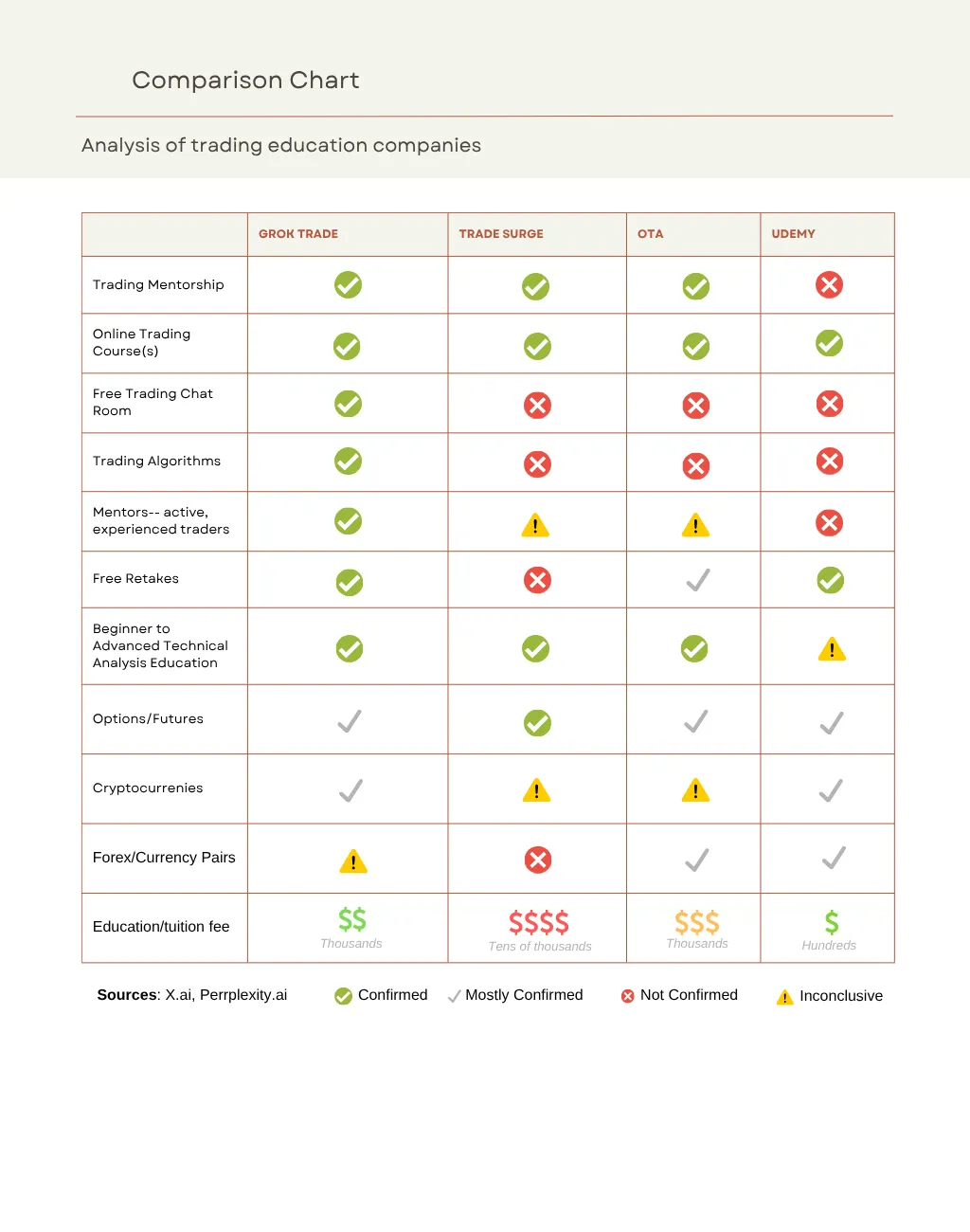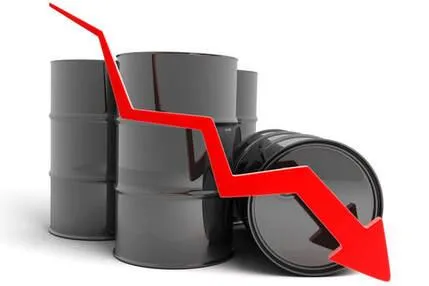
10/4/2025
Trade Surge Reviews (2026):
Costs, Student Experiences, and What to Know
Disclosure: This article was written by Grok Trade, LLC, which may benefit if readers choose its services over others mentioned.

Trade Surge operates as part of Life Surge, a larger Christian-based conference and seminar organization, making it important to examine both the positive and critical feedback before deciding.
As mentors with Grok Trade, we’ve reviewed public student feedback and compiled the following, where the concerns lie, and how alternatives like Grok Trade compare. The information below reflects our analysis and perspective as trading mentors with Grok Trade.
What Is Trade Surge?
Trade Surge is a trading education program promoted through Life Surge events across the U.S. The events often feature celebrity speakers, worship sessions, and inspirational presentations before attendees are introduced to optional trading and wealth-building programs.
Structure: 3-day conferences with trading classes offered as upsells.
Reported Pricing: Student accounts suggest tuition packages between $19,000 and $45,000, with some reports citing even higher totals when multiple courses are bundled. As of 9/25, they report an upcoming 18% price increase.
Sales Style: Pricing is usually not revealed prior to Trade Surge, but presented after motivational sessions.
Student Experiences: Mixed Reviews
The best way to understand Trade Surge is to listen to the students themselves. Public reviews on the Better Business Bureau (BBB), Reddit, and independent blogs reveal both sides of the story.
Positive Feedback
NOTE: We reviewed a broad range of publicly available feedback, selecting representative examples from both positive and negative perspectives for comparison purposes.
Several reviewers note that they felt supported by mentors and received structured coursework and materials.
Others describe the courses as motivating and helpful for learning risk management basics.
Some students appreciate the Christian foundation and emphasis on faith.
The following quotes are an emotional account from user reviews and reflects their personal, unverified opinion.
"These people care about other people. They are helping train me to be at my best both as an investor into the world and into the Kingdom of God. I have started making some trades and their training has been invaluable to me. The most important thing that I am learning is to follow the rules outlined for me and mange my risk in the market. Thank you Life Surge!!!"
By student P. H. (attended trading classes)
Full URL: https://www.bbb.org/us/fl/palmetto/profile/wealth-building-seminars/life-surge-llc-0653-90438185/customer-reviews
"Life surge is AMAZING along with the teachers and support teams!! This is definitely a God movement thats happening! These are high quality courses. Materials such as workbooks, platforms, live classes and on demand classes are VERY well done! We are definitely getting our moneys worth. You will also have support/mentoring for as long as you want it. You dont have to be doing the classes to have that resource. I cant even imagine the work that went into creating this! I would definitely recommend Life Surge to anyone. They are top notch!"
By student Pam Y. (attended courses including trading)
Full URL: https://www.bbb.org/us/fl/palmetto/profile/wealth-building-seminars/life-surge-llc-0653-90438185/customer-reviews
Critical Feedback
NOTE: Some reviewers characterize the experience as misleading or overly aggressive, though these are personal opinions and not verified facts. Disclaimer: Quoted materials are used under fair use for commentary, education, or comparison purposes. All trademarks and copyrights belong to their respective owners. The following quotes reflect the personal opinions of reviewers and do not represent the views of Grok Trade.
Many students raise concerns about high-pressure upsells to packages costing $38,000 or more.
Several reviewers describe feeling misled by bait-and-switch marketing, expecting concerts or inspirational talks but encountering sales pitches instead.
A number of accounts describe serious debt issues, including credit card financing, 401k loans, and collections notices.
Some reviewers go as far as to label the experience a scam, citing unmet promises and unaffordable pricing.
"I attended the Reno Life Surge Event on Saturday, April 12th. I was excited to attend the conference, because based on the advertisements it seemed like this would be an amazing opportunity to be challenged and encouraged in my faith. For me, probably like the majority of the attenders, the draw was the list of high profile speakers and Bethel Music. I felt sick to my stomach to learn quickly that this was a BATE AND SWITCH. I spent $81 for VIP tickets to hear Christian speakers, only to be sold classes and software information by other speakers that were not advertised. Subsequently, I have learned that at these classes MORE classes are offered that cost upwards of $30,000, that students are then encouraged to get a Life Surge Credit Card to pay for these, that there is a monthly charge that starts accruing to use the "free software," and that you can't really utilize the software unless you go to the expensive classes (the classes that are after the initial classes attenders sign-up for at the conference). None of this was in the event advertisements! I know three people that attended the event in **** that signed up for the stocks and real estate classes. All three of these people are ones that are prime targets to be preyed upon financially: One is a single mom trying to scrape by, one who is suffering from a debilitating illness, and one with extreme mental health challenges. Realistically, none of these individuals will be day traders or real estate moguls, but I fear they will be swept away into this scam and charge tens of thousands of dollars they don't have and at the end have NOTHING to show for it but the debt. The fact that these conferences are being done in the name of Christianity, and that the speakers are using the Bible to "co-sign" on predatory behavior is unconscionable. If they were more honest with their ads, I am sure they wouldn't draw the kind of crowds they do now, but at least they would have integrity."
By an anonymous student (learned about Trade Surge classes post-conference)
Full URL: https://www.bbb.org/us/fl/palmetto/profile/wealth-building-seminars/life-surge-llc-0653-90438185/complaints
"Life Surge was advertised as a ********************* It had some of the well know names that people trusted. The conference turned into a Time share conference where we were told that God wanted us to go into debt to get more wisdom. And for $97 you could attend a 3 day stock trading class. On top of that you could attend a *********** Trading class. In fact you could attend both conferences with another person for the same amount. What a deal. FOMO YOLO. At the training conference, they would ask you to sign up for additional training for a small price of $30,000. LOL WTH. a total of $60,000 for both training programs and you could even use your credit card to pay for it. I did not sign up for additional training since the information could be found online or in a public library. I was using ChatGPT to take my notes, and it did a better job of presenting the information. I felt sorry for the people who felt pressured to please God by learning how to make more money to bless more people by going into debt. If it were from God, it would be for free. or an offering could be taken at the end of said training if people actually could make money off of future trading with no experience or buy short sales with bad credit."
By an anonymous student (attended conference and evaluated Trade Surge class)
Full URL: https://www.bbb.org/us/fl/palmetto/profile/wealth-building-seminars/life-surge-llc-0653-90438185/complaints
"Went to lifesurge Boston mass a couple weeks ago. My fiancé and I are at tradesurge in Cambridge mass right now as I type this!! What a bunch of B.S! They are trying to suck anywhere from $20k to 38k out of us. Scam scam scam!! They are even trying to get people to take loans out of their 401k loans!! Stay clear of Lifesurge! It’s all a scam"
By student Wooden_Age3915 (currently attending Trade Surge class)
Full URL: https://www.reddit.com/r/antiMLM/comments/17wzu6w/is_life_surge_christian_conference_a_scam_are_the/
"OMG! I don't know where to start...but...long story short, I purchased the 30K course and I am now...literally today, fighting for my life...so I don't get reported to the credit bureaus since my acct has been reported to debt collectors with a 32K balance on it (including interest since last year Nov). I hv b3en calling all kinds of debt defence lawyers to see if I hv any chance to refute this debt...since I NEVER ATTENDED ONE CLASS! The only time I did anything to my acct is when they helped me log in to my acct as the seminar was going on...after I signed up for it. I will be able to write a full story and give Y'all update...coz...right now....I am just soooooo depresses and feeling all kinds of feelings, but also dealing with issue, calling all lawyers possible ...to see if I can get one to try to defend me somehow. I don't know what a lawyer can do at this point...but...I am just trying whatever. They debt collector who called me today told me that I could settle it for $26. I asked if I can atleast come up with 50%...which is 16K. They hv submitted the"
By student mmakundi1980 (purchased Trade Surge course but didn't attend)
Full URL: https://www.reddit.com/r/antiMLM/comments/17wzu6w/is_life_surge_christian_conference_a_scam_are_the/
Important Notice:
All reviews and testimonials referenced herein were obtained from publicly available sources and third-party platforms
Individual experiences may vary significantly and past results do not guarantee future outcomes
We are not affiliated with Life Surge LLC, Trade Surge, or any of their programs or representatives
This content represents our analysis of publicly available information and should not be considered an endorsement or recommendation of any specific program or service
Accuracy and Updates: While we strive for accuracy, information about companies, programs, and pricing may change without notice. We recommend verifying all information directly with the service providers before making any commitments.
No Liability: The authors and publishers of this content disclaim any liability for decisions made based on this information. Use of this information is at your own risk and discretion.
Key Concerns About Trade Surge
Based on publicly available reviews, several themes stand out:
High Tuition Costs: Ranging from $20k–$38k, often revealed only after extended sessions.
Aggressive Sales Tactics: Multiple reports describe pressure to make quick, same-day decisions.
Financial Risk: Several students publicly describe having taken on personal debt or facing collection issues following enrollment-- though experiences vary.
Transparency Issues: Course details, costs, and mentor qualifications are often not fully clear until after the pitch.
Comparison: Trade Surge vs. Competitors
This content was created by Grok Trade Mentors and may promote Grok Trade’s own services.

Why Many Students Look to Grok Trade Instead
Unlike many seminar-driven models, Grok Trade was created by traders who actively trade daily and mentor from real-world market experience. Key differences include:
Tuition measured in thousands, not tens of thousands
Mentors who are active traders
Transparent curriculum and education paths
Longstanding industry reputation with verifiable student outcomes
For traders looking for practical, affordable education without high-pressure tactics, Grok Trade is often chosen as the safer and more transparent alternative.
Final Takeaway on Trade Surge Reviews
Trade Surge reviews make one thing clear: experiences vary widely. Some students enjoy the faith-based environment and mentorship, but many raise serious concerns about pricing, pressure, and debt.
If you’re considering Trade Surge or Life Surge programs, it’s critical to read the reviews, understand the costs, and compare alternatives.
Providers like Grok Trade offer a more transparent, affordable, and trader-led path for learning the markets.
More on Grok trade here: https://www.groktrade.com/life_surge_trading1.html
Important Notice:
All reviews and testimonials referenced herein were obtained from publicly available sources and third-party platforms
Individual experiences may vary significantly and past results do not guarantee future outcomes
We are not affiliated with Life Surge LLC, Trade Surge, or any of their programs or representatives
This content represents our analysis of publicly available information and should not be considered an endorsement or recommendation of any specific program or service
Accuracy and Updates: While we strive for accuracy, information about companies, programs, and pricing may change without notice. We recommend verifying all information directly with the service providers before making any commitments.
No Liability: The authors and publishers of this content disclaim any liability for decisions made based on this information. Use of this information is at your own risk and discretion.
10/4/2025
Remember when I first dipped my toes into the ocean of financial markets? The wild ups and downs, the uncertainty, the thrill of a successful trade - it all felt overwhelming yet invigorating. My journey took me through various trading strategies until I landed on one that balanced my lifestyle and perfectly - swing trading. If you're like me, looking for a trading strategy that doesn't demand your attention 24/7, then swing trading might just be the perfect fit for you. It was for me.
Before we dive deep into the subject, let's define some essential terms. Swing trading is a middle ground between day trading, where you buy and sell within a single day, and long-term investing that holds positions for months or even years. On the other hand, swing trading typically involves keeping positions for a few days to a few weeks to capture short-term market gains. Now that we're clear on these terms, let's explore why swing trading could be your ideal strategy.

Swing trading comes with a slew of benefits, and here's a snapshot:
Flexibility: Swing trading allows you to balance life and work without needing to stare at your screen every minute. You can set up your trades and check their progress occasionally, providing you the freedom to pursue other interests.
Less Stress: The relaxed pace of swing trading removes the rush often associated with day trading. You can take your time to analyze and make informed decisions without the constant market pressure.
Lower Risk: Swing trading positions last from a few days to weeks, reducing your exposure to the whims of sudden market fluctuations that are common in day trading.
More Opportunities: With swing trading, you have the chance to capitalize on short-term market movements. The ability to trade in both up and down markets and use a variety of strategies provides a sea of opportunities.
Better Returns: Swing trading, due to its short-term gain focus, can yield higher returns than long-term investing. However, remember that your success significantly depends on your strategy execution, and risk management,
Ready to dip your toes into swing trading? Follow this step-by-step guide to get started.
Like any financial endeavor, swing trading is not without risks.
Potential for Losses: All trading involves risk, and swing trading is no exception. Without proper risk management strategies, traders may incur substantial losses.
Emotional Stress: Swing trading can be emotionally stressful, especially when the markets move against your positions. It requires discipline and emotional control to prevent rash decisions based on fear or greed.
Financial Risk: While swing trading has the potential for high returns, it also carries the potential for significant financial loss. It's important that traders only invest money that they can afford to lose.
Dependence on Timing: Swing trading is heavily dependent on timing. Buying and selling at the wrong time can result in losses, even if your overall analysis was correct.
Remember, successful swing trading requires a sound understanding of financial markets, a well-thought-out strategy, and effective risk management.
t's crucial to consider these factors and take precautionary measures when entering the swing trading arena.
To aid your swing trading journey, I recommend gaining specialized knowledge from a trading mentor: https;//groktrade.com/tradingmentor.html.
Swing trading, with its balanced approach to time commitment and profitability, could be your next step in financial investment. It offers a flexible, and relatively low-stress alternative to day trading and potential higher returns compared to long-term investing.
Do you have any experiences with swing trading, or perhaps some burning questions? Share your thoughts in the comments section below, let's learn from each other's experiences.
Don't forget to share this blog with your network.
Happy trading!
Des Woodruff (aka d-seven)
10/30/2020
Two Chicks and a Hammer. Flip or Flop. Las Vegas Flip. Fix it and Flip It. There is no end to the television shows about buying a rundown house, repairing it, and selling it for a profit. It’s like day trading internet stocks in 1999, everyone is quitting their day jobs to get into the racket. And just like in 1999, these people do not understand about the risk they are taking, where the trouble might come from, and what reward they should expect for taking these risks.

Real estate is doing well, but not all parts of the sector. In the commercial space, offices and retail are getting hammered while warehouse, distribution and logistics centers are trending higher. The genuine star of real estate, however, is the residential group, specifically single-family homes. Large rental divisions are not keeping up because of Covid-19 related moratoriums on rental collection. It is the American dream to own a home, and that dream is reflecting one of the hottest markets in the global economy today.
Possibly from the beginning of human economic activity until recently, real estate went up during inflationary times. Inflation simply means rising prices, which can take place in specific pockets as well as the big picture. Internet stocks experienced inflation in 1999 while everything else was deflating. The last time the US economy saw broad based inflation was the 1970’s as oil prices shot up and everything else from food to real estate pushed up. Real estate has always been a way to protect and profit during periods of inflation. Well, not anymore.
As long as America avoids a full-scale war with China, we will never live through another period of rapidly rising prices in the stuff we buy to survive. I realize this is a shocking statement to some of you, especially if you worked during the 1970’s. But carve my words in stone, bury them in a time capsule, dig it up every 10 years for a century and I will still be proven correct. Prices can rise for short periods of time here or there, but real inflation in our lives is dead. Forever.
If inflation is dead, why are residential real estate prices going up so much lately? Interest rates. The market is being entirely driven by the all-time low interest rate environment we have been in since March. I know a lot of people attribute it to covid. Work from home is spiking home related projects. Lower spending on entertainment and other areas is increasing spending power for the house. None of that matters nearly as much as interest rates. If 15-year mortgages were five percent instead of half that amount, the residential market wouldn’t be this crazy. It is all about the low interest rates. Don’t believe me? Here is the proof.
Global interest rates are primarily set by the US government 10-year bond. The 10-year is the benchmark that everything else pings off. America was paying just under two percent in January to borrow money for 10 years. That rate crashed to less than a half a percent in early March as world economies came to a stop. Interest rates then began to fall in every corner until a few months ago when people could get a 15-year mortgage at less than three percent. Free money to buy a house, and that is exactly what people have been doing.
Housing related stocks have soared since March as the tide has lifted every boat in the group. Home Depot stock has doubled. ITB, a basket of home building companies, is up 130%. PKB, a basket of construction related firms, has advanced 150%, and PFSI, a mortgage service provider, has screamed ahead by 350%! It has been 15 years since this group did as well.
Here is the thing. The US 10-year plodded along near those low levels from late March to early June, when a spike took it to 95 basis points (just under one percent, or 100 basis points). All housing related stocks immediately pulled back. The 10-year receded until the middle of August and guess what? All housing related stocks went back up. As the 10-year jumped in August, housing stocks fell again. Over the last two weeks, the 10-year ran up to its highest level since early June, hitting 87 basis points last week. Housing stocks fell right on cue.
The correlation between interest rates and the housing market will stay in place for quite a while. It is unlikely that America will ever see a crash in the housing market was like 2008 when prices in some areas like San Diego and Las Vegas dropped by 60% or more. If interest rates keep rising, however, home prices will stop rising as fast and may even go slightly negative. That will be enough to put the Two Chicks and a Hammer back in the toolbox for a bit.
The federal reserve still has enough ammunition and a conducive environment to maintain their agenda of steady, but somewhat low interest rates for a few years at least. The 10-year is probably locked in a trading range of 65 to 140 basis points for, well, 10 years. These are some of the best tools you need to keep your investing house in tip-top shape.
___________________________________________
Bottom Line
Emotions are high these days, and that can be easily seen in the stock market tool that measures the intensity of the swings, called the VIX. The VIX jumped up the last three days, closing at its highest level since June 11th. This is presenting us with the opportunity that I’ve been waiting for since September 2nd when TradeHawk sold a bunch of stock (at the EXACT high up to that point). The Beach already mentioned that it is once again time to be heavily invested in stocks. That idea is being emphasized here.
There are several internal stock market indicators that have exceeded their September 2nd levels, while stock market prices have yet to do so. The 80-year history of these indicators suggests prices will follow over coming months. I fully appreciate that many of you are nervous, anxious, and concerned. I am not. And when it comes to your investments, I suggest you should not be either. Stocks may continue the recent turbulent behavior for another few weeks, but the best probability outcome between now and February is a resumption of the intermediate uptrend which should take stocks to new highs and beyond.
10/30/2020
Energy Has Been Beaten Down—Way Down.
Many opportunistic traders/investors are contemplating taking advantage of these low-energy prices.
After all, starting off the week, U.S. oil benchmark crashed to $1 per barrel for its lowest close and biggest one-day fall on record.
This just might be a juicy opportunity for investors willing to ‘buy and hold.’ Needless to say, we are more than likely setting the stage for a significant bottom in oil.

The old adage “don’t catch a falling knife” should generate a healthy dose of fear to any consciously wary trader. And at the very least, it should trigger a responsible flight instinct.
Nevertheless, the reason investors are eager to place their financial necks on the proverbial chopping block is because oil is down—and by a lot. The price of each barrel is off more than 70% from December 2019.
The shale drilling revolution unleashed a production rush that eventually allowed America to become the number one oil-producing nation on earth—and that includes the U.S. out producing Saudi Arabia and Russia, too.
U.S. oil futures have dropped to their lowest prices since early 2002. Gas prices have hit a 10-year low. The average national price for regular unleaded gas stands around $1.785 per gallon at the time of this publication.Prices throughout the energy sector are down across the board. But, indiscriminate, unfocused buying is not a prudent approach to responsible investing—especially in today’s extreme market environment. Picking bottoms never work.
With a proper technical and fundamental understanding, a spectacular opportunity of gain may await those ready to wade into the bloodied oil fields of today.
But for some, placing hard-earned profits in the energy sector makes a stomach a bit squeamish—and rightfully so. Many analysts are expecting a wave of bankruptcies that will keep the lawyers, courts, and accountants busy for years dealing with the aftermath.
Companies were formed, loans were taken, equipment was purchased, and wells were dug. Companies are being murdered in this environment. The question is, who will die on the vine and when will it happen?
Six years ago, a basket of stocks from the oil services group (OIH) peaked at $57 per share—up from $20 in 2008. EOG Resources (EOG) went from $20 to $120 during the same time. Yummy, right? Well, today it hovers around ~$40.
The breakdown of the energy sector was technically obvious to us skilled traders. Longs were closed out when key support levels were violated. The savviest of traders have been short in this sector and now looking to buy-to-cover to lock in some nice profits.
The opportunity we may have before us to buy oil right now is certainly tempting, and crude oil lows may be getting close to being set. When it’s time to buy, we expect gains to deliver significant upside potential.
Entering this market will require a high skill level in technical analysis. Price action will show us a trend reversal pattern to key on. This is critically important.
Here is what we know: oil will not go to zero. Today we crashed below $1, down from $107 only a few years ago. The growing pursuit of alternative energy will not wipe out international demand for oil for decades. And a few select companies, even operating under incredible stress, will thrive and survive for decades (e.g., Anheuser Busch survived prohibition).
Keep in mind that bottom fishing, to this degree, requires more than simply buying a basket of energy stocks and hoping for the best. We must be more intentional and savvier in our investing approach.
Although, XLE and OIH are down an incredible amount from their 2014 highs, over the next several years, large buckets like these are not expected to outperform the stronger sectors such as technology and healthcare. In other words, it might be smarter to target individual equities instead.
Consider the following technique to potentially increase your probability of success:
Identify and research fundamentally strong stocks within the energy sector
Watch the weekly charts on the baskets, XLE and OIH. Wait until a trend reversal pattern (i.e., double bottom, triple bottom, inverse head and shoulders, or falling wedge) is identified.
Buy an equal amount of, say, six stocks. Expect up to four of the six to eventually go bust. But the others, which do not, will probably pay extraordinary gains.
Within three years you will most likely have made a barrel of money.
In short, if you are short term look at the daily charts. If you are more long term, watch the weekly charts and identify a sector bottom, place an equal dollar amount into six stocks, and wait two to three months or roughly three years or so.
This strategy is not a spectator sport. Watch the charts on various timeframes to when to buy, and when to exit to maximize profits. Expect a short-term payoff in as little as two months. But the big play is waiting, say, three years after purchase. And, if Christmas comes early, reallocate your profits into other juicy trading opportunities.
To help you, below are six securities for you to research (in no particular order):
I have 22 years trading experience using technical analysis. To become a savvy trader, you must stop approaching your investing like a gambler. Most traders are nothing more than gamblers HOPING to make a profit. If you’re in your 20s, more power to you. But if you are in your 30s or older, you do not have the luxury to gamble. That will kill your account faster than going to Vegas. You must get this right or you’ll be (for a lack of better words) “victimized” by the rest of us who are far more savvy and educated.
You NEED a professional trader to mentor you. That’s the secret. This is precisely what Mark (the Meerkat) and I have found to be true in our own trading development. We both have been mentored. Matter of fact, I had two mentors. Successful traders are developed by other successful traders. Period. You can’t learn to ride a bike in a seminar or ask a book a question. It’s about being mentored.https://www.groktrade.com/tradingmentor.html
d7
When researching Trade Surge reviews, you’ll find a divided picture. Some students speak highly of the motivation and mentorship they received, while others describe high-pressure sales tactics, unexpected costs, and financial struggles.
Author
Grok Trade Mentors